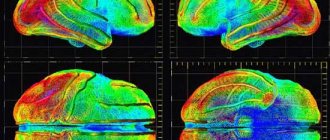From this article you will learn:
- What are the causes of senile dementia?
- Can an infectious disease lead to the development of senile dementia?
- What are the stages of senile dementia?
- Is it possible to recover from senile dementia?
- How to prevent the development of senile dementia in yourself?
With age, the human brain undergoes changes that negatively affect cognitive functions. Elderly people often have memory impairment, lose professional and social skills, and lose the ability to learn. Similar symptoms are observed in 3–5% of those over 60 years of age and in 20% of those over 80 years of age. These are typical signs of senile dementia. Its official name is senile dementia. What it is, what are the reasons for its appearance and methods of treatment, what kind of help is required for a person who has been given this difficult diagnosis - you will learn from our article.
Why does senile dementia develop?
Among the most obvious causes of senile dementia, doctors note damage to the central nervous system caused by diseases that lead to degeneration and destruction of brain cells.
The opinion of most experts is that the victims of this disease are people with pronounced problems of the circulatory, nervous systems and psyche. Heredity does not play a decisive role in the development of senile dementia, but this risk factor cannot be completely excluded.
We recommend
“Senile dementia: causes, symptoms, patient care”
More in more than half of cases, senile dementia is associated with degenerative processes in the nervous system. This is typical for the so-called senile dementia of the Alzheimer's type, in which the cerebral cortex suffers, and its destruction is an independent disease.
In addition to Alzheimer's disease, proven causes of senile dementia include:
- age-related changes in the vessels of the brain (atherosclerosis) - deposition of cholesterol plaques on their walls, narrowing the lumen of the vessels and disrupting the flow of blood to the brain cells, as a result of which the supply of nutrients deteriorates and the risk of stroke increases;
- thinned inelastic vessels that are unable to restrain the normal flow of blood, which leads to its effusion into a certain area of the brain and subsequent tissue necrosis with inevitable neurological consequences;
- some infectious diseases (AIDS, viral encephalitis, meningitis);
- head injuries: a concussion is accompanied by a severance of neural connections and subsequent replacement by connective tissue;
- the presence of a tumor, including a benign one, which causes disruption of normal brain activity: a growing tumor compresses neighboring areas of the brain and negatively affects its functioning.
Additional risk factors contributing to the appearance of senile dementia include diabetes mellitus, hypertension, chronic alcoholism - diseases that adversely affect the condition of nerves and blood vessels. Problems with blood supply to the brain due to poor condition of the vascular system cause inhibition of cognitive functions. Senile dementia can be a consequence of either one acting factor or a combination of them. In this case, senile dementia of mixed type is diagnosed.
The mechanism of development of mental disorders in old age is quite complex. First of all, the changes affect the functions of the hypothalamic structures, especially those regulating metabolic and endocrine processes (pituitary gland). An imbalance of hormones negatively affects the functioning of a variety of body systems, including a negative impact on the functioning of the cortex and subcortical structures of the brain, which become overly susceptible to external factors. Situations that are harmless to a healthy person can cause a nervous breakdown in a patient with senile dementia.
The progression of the disease is accompanied by the death of neurons that are responsible for mental and mental activity, as well as social adaptation. Memory loss occurs, the ability to acquire new skills and logical thinking is lost. Over time, interest in surrounding people and events fades away, and the later stages are characterized by an inability to take care of oneself in everyday life.
The morphology of senile dementia manifests itself in a decrease in brain mass and volume due to atrophy. Its uniformity is expressed in the preservation of proportions between brain regions, their configuration, sharpening of the gyri and expansion of the sulci and ventricles.
There is a decrease in the size of neurons, their compression while the contours remain unchanged. In place of the dead nerve processes, connective tissue is formed, thanks to which they become sclerotic, that is, glued to each other.
Causes of dementia
The fundamental factor in the development of senile dementia is the already existing Alzheimer's disease, which is also called dementia of the Alzheimer's type, in which the irreversible process involves the breakdown of brain cells. Another cause of pathogenesis may be vascular destruction of the brain. In this case, the disease is classified as vascular dementia. Less commonly, the onset of dementia disorders can be influenced by brain neoplasms, including head injuries, nervous system disorders, and others. This subtype of the disease is called non-progressive dementia.
Forms of the disease and stages of senile dementia
Regardless of the causes of the disease, it is characterized by common symptoms, the main of which can be called memory disorder. The brain in different patients is affected to varying degrees, so there are several forms of senile dementia:
- mild senile dementia, in which social activity decreases, but the ability for everyday self-care is fully preserved;
- moderate senile dementia, it is characterized by loss of skills in using modern technology, the patient finds it difficult to endure prolonged loneliness, but the ability to care for himself is not lost;
- severe senile dementia, when we are talking about complete social maladaptation of an elderly person and inability to self-care.
From an etiological point of view, senile dementia belongs to one of three groups:
- atrophic (primary damage to brain neurons, not associated with vascular disorders, occurring against the background of Alzheimer's disease, Pick's disease or dementia with Lewy bodies);
- vascular (secondary damage to nerve cells due to impaired blood supply to the brain);
- mixed.
We recommend
“Senile dementia: causes, symptoms, treatment” More details
Senile dementia is a progressive type of disease, there are three stages:
- Initial. Against the background of impaired intellectual activity, the patient understands that he needs treatment. The ability to perform normal household activities is retained - cleaning, preparing food, and performing personal hygiene.
- Moderate. Intellectual activity deteriorates, the ability to critically assess one’s own condition decreases. Carrying out everyday activities causes difficulty; an elderly person forgets to turn off the gas and electrical appliances, or close the door lock, thereby exposing himself and others to danger. Patients at this stage require constant supervision, but they are still able to eat, wash, and dress independently.
- Severe dementia. The stage of complete disintegration of personality begins. The patient does not recognize his relatives, does not feel hungry or thirsty, cannot eat on his own, refuses to communicate and loses the ability to think logically. Over time, movement disorders develop, the patient does not walk or chew food. It requires constant care.
Characteristics of mild severity
When the disease progresses relatively favorably, we are talking about mild dementia. But even with such a note in the diagnosis, the deviation in behavior is noticeable to the naked eye. Mild severity is characterized by the following symptoms:
- ability to work is lost or significantly limited;
- orientation in person and place is preserved, in time it may be somewhat approximate;
- the ability to perform household tasks and self-care is preserved;
- memory and intellectual sphere are significantly impaired;
- maintains a critical attitude towards the disease;
- the ability to communicate weakens, tearfulness, anxiety, and depression may develop;
- Loss of interest in usual hobbies.
Disadaptation in this case is limited to refusal to actively participate in complex areas of activity - work, communication, hobbies. Most of these patients can live separately, but in rare cases, due to emotional lability, they require periodic patronage. People with dementia are able to visit familiar places, but should not be allowed to travel long distances to unfamiliar places.
Important! Serious financial transactions and business negotiations involving people with dementia should also be carried out under supervision.
Slowing down the pace of thinking, memory function, and inability to long-term planning makes the patient feel inferior. With this degree of severity of dementia, when criticism is still preserved, it is especially important to provide support - talk, encourage, motivate to fight. With a competent therapeutic approach, patients with such characteristics of disorders maintain a fairly high level of quality of life.
Treatment of senile dementia and prognosis
Cases of complete relief from this disease have not yet been recorded. Most often we are talking about measures to stabilize the condition, slow the progression of the disease and maintain an acceptable quality of life for the patient.
The need for inpatient observation arises with symptoms that cannot be relieved in an outpatient setting - confusion, acute affective states. In most cases, an integrated approach to treatment is used, including medication and psychotherapy, as well as work with relatives in whose care the patient is.
Timely administration of medications can prevent a sharp deterioration of the condition. Experts prescribe nootropic drugs, drugs to improve blood supply to the brain, and stimulants of dopamine receptors in the central nervous system to patients with senile dementia. Tranquilizers and antidepressants are used according to indications.
With the vascular etiology of the disease, medications are needed to reduce blood pressure and cholesterol levels. Psychotherapy is aimed at maintaining social adaptation and communication with loved ones. The patient is not allowed to withdraw into himself, he is encouraged to live an active life, moderate physical and mental stress.
We recommend
“Treatment of dementia in older people: drugs for different stages of the disease” More details
The general condition of the body is of great importance, therefore patients with senile dementia are strictly recommended to have a healthy lifestyle, avoid bad habits and treat concurrent diseases. First of all, you should get rid of risk factors: for example, if the cause of the disease is a stroke, you need to lose weight, keep your blood pressure under control and exercise regularly.
Diabetics need to periodically measure their blood sugar and avoid dietary violations. When senile dementia is caused by tumors in the brain, operations are performed to remove them. Concomitant hypothyroidism requires appropriate hormonal therapy.
The World Health Organization predicts an increase in the number of cases of senile dementia diagnosed in the coming decades. Experts attribute this to a trend towards an increase in the incidence of obesity, hypertension and diabetes, which often serve as a background for vascular-type cognitive disorders.
Each family solves the issues of caring for patients with senile dementia in its own way. The most common options are supervision by immediate family, the services of a professional caregiver, or placement in a specialized medical facility. It is believed that patients endure being in a familiar environment less painfully, but for relatives, coexistence with such an old man becomes a real test.
Competent care greatly prolongs the life of older people with Alzheimer's disease or senile dementia of vascular origin. A combination of pharmacological and psychotherapeutic treatments makes it possible to delay their care.
A complete cure for senile dementia is impossible; the brain undergoes irreversible changes that modern medicine cannot stop. Early diagnosis and appropriate medication support delays the onset of complete personality destruction, as a result the patient can live up to ten years.
We recommend
“What to do for an elderly person with dementia” Read more
Treatment of senile dementia in the clinic
Treatment of dementia, especially in old age, is a very labor-intensive process. And, naturally, it is impossible to completely cure senile insanity, since during its development irreversible processes occur in the brain. However, it is possible to stop further progress and restore some of the lost brain cells. To achieve this, therapy must be comprehensive and multifaceted.
The following medications are prescribed to the patient:
- psychostimulants to improve the adaptation of the nervous system to new physical and mental stress;
- nootropics that improve the ability to perceive and remember information;
- tranquilizers to cope with anxiety and improve sleep quality.
- B vitamins that strengthen the nervous system;
- antidepressants and antipsychotics according to indications.
The prognosis of senile dementia depends on the conscientiousness of following the doctor’s recommendations, the patient’s physical activity, and timely treatment of concomitant somatic diseases. Severe forms develop more quickly with early onset dementia.
Prevention of senile dementia
To prevent the development of senile dementia, we recommend:
- Do gymnastics regularly and maintain physical activity;
- solve simple problems, spend more time in the fresh air, attend entertainment and developmental events;
- eat right, enrich your diet with vitamins, especially folic acid and group B;
- Reduce alcohol consumption to a minimum and quit smoking.
The specialists at the Transfiguration Clinic have extensive experience in recognizing the development of senile dementia at its very beginning. Thanks to this, we always help patients and their families to prolong a calm, happy and full of impressions life for many years.
When treating senile dementia, we guarantee
- an individual approach to solving your problem;
- selection of optimal therapy;
- correct selection of medications and procedures;
- training in proper care of this group of patients;
- conducting psychotherapy to restore impaired cognitive functions;
- prevention of complications from concomitant diseases;
- improved quality and life expectancy;
- regular and urgent consultations with qualified specialists.
You can contact the clinic’s specialists by phone in Moscow.
Effective prevention of senile dementia
Medicine does not yet know methods that can completely eliminate the risk of senile dementia, but the effectiveness of some measures that reduce the likelihood of the disease has been scientifically proven.
The diagnosis of senile dementia is much less common in people who:
- adhere to the principles of proper nutrition, monitor the level of cholesterol in the blood;
- do not smoke and drink alcoholic beverages very moderately;
- exercise regularly.
Activities that require intellectual stress help prevent the development of cognitive disorders. Among those who like to read, solve crosswords, play chess and solve logical problems, there are very few patients with senile dementia. The risk of senile dementia is also reduced for those whose hobbies involve fine motor skills of the fingers - fans of knitting, bead weaving and assembling pictures from puzzles.
The topic of senile dementia has been well studied by experts and, based on the results of numerous studies, it is possible to formulate recommendations that will minimize the risk of this disease.
- Diet It has been noted that among the residents of Italy, Greece and other Mediterranean countries there are many long-livers and few cases of senile dementia (compared to other territories). Scientists believe that one of the reasons is the peculiarities of the diet, which is dominated by fish and seafood, olive oil, fresh vegetables and wine.
Including the following products in your daily menu will help reduce the risk of senile dementia:- greens (salads, dill, parsley, cilantro);
- berries (blackberries, blueberries, strawberries, raspberries, blueberries);
- nuts (walnuts, cashews, almonds, peanuts, Brazilian);
- legumes (peas, chickpeas, beans, soybeans, lentils);
— fish (mackerel, hake, pollock, herring, tuna, carp, crucian carp, pelengas);
- olive oil;
- dry red wine;
- poultry meat - turkey, chicken, guinea fowl;
- whole grains.
- Air
The atmosphere polluted by exhausts from industrial enterprises and motor vehicles negatively affects the cognitive health of residents of megacities. In large cities, more cases of senile dementia are recorded than in ecologically clean areas. - Alcohol
Excessive consumption of alcoholic beverages is harmful to the body. Alcohol, especially strong alcohol, is categorically not compatible with the principles of a healthy diet and is not recommended for use for the effective prevention of senile dementia.However, there are research results from Italian scientists, according to which, in elderly people over 65 years of age who regularly consumed dry wine, cognitive impairment was noted less frequently than in absolute abstainers. Doctors explain this by the positive effects of small doses of alcohol on the cardiovascular system and the antioxidant effects of wine.
- Vitamin D
Studies of the effect of vitamin D were carried out in different countries, and the results of experiments clearly confirmed that its low content in the blood serum greatly increases the risk of senile dementia.Vitamin D has a positive effect on the condition of blood vessels in the brain and stimulates white blood cells, the function of which is to cleanse the body of amyloid accumulations, a protein that causes memory loss and provokes the development of Alzheimer's disease.
We recommend
“Vitamins for older people over 70: which ones are needed first” Read more
The source of vitamin D is sunlight and fatty fish. If you cannot obtain enough vitamin D naturally, you must take it in the form of dietary supplements. - Mood
Senile dementia is more susceptible to emotionally unstable people who take even minor troubles to heart throughout their lives. In order to prevent senile dementia, it is recommended to react more calmly to stress, everyday troubles, and family discord. - Sleep patterns
Sleep disturbances can also trigger the development of Alzheimer's disease and other types of senile dementia. Insomnia leads to the fact that the body is not cleansed of toxins that appear as a result of the breakdown of proteins. Their accumulation in tissues has a degenerative effect on brain cells. - Physical activity
To maintain normal condition, the body needs movement. It stimulates active blood circulation and oxygen supply to the brain. This does not mean that you need to exhaust yourself by running marathon distances, we are talking about the doctor-recommended 8-10 thousand walking steps daily. - Environment Loneliness
has an indirect influence on the development of senile dementia. Older people living away from relatives are more likely to suffer from cognitive impairment. Of course, older people surrounded by children and grandchildren are also not immune to this diagnosis, but in general they are less at risk of senile dementia. Constantly being immersed in the daily activities of the younger generation allows them to maintain clarity of mind and interest in life longer.
How to behave if a loved one is diagnosed with senile dementia
Age-related cognitive disorders often have a greater negative impact on the patient’s environment than on himself. An elderly person suffering from senile dementia gradually loses the ability to critically assess his condition as the disease develops, while the inappropriate behavior of a person with dementia places a heavy burden on loved ones. This is a difficult test that millions of people go through, forced to watch the gradual decline of a loved one.
We hope our advice will help you set the right attitude towards a patient with senile dementia. In psychiatry the following recommendations are given:
- Become familiar with the first signs of the disease. This will allow you to contact doctors as early as possible and prescribe treatment. Early diagnosis of senile dementia prolongs the normal life of an elderly person and minimizes negative consequences.
- No matter how difficult it may be, try to maintain the same attitude towards the patient. Just because he doesn't answer you doesn't mean he doesn't hear or understand anything. Do not allow your communication to be reduced only to physiological manipulations - feeding, washing, changing clothes.
- Avoid being overly emotional. A person suffering from senile dementia can be harsh and unpredictable in his actions. Try to take this calmly, avoiding retaliatory aggression.









